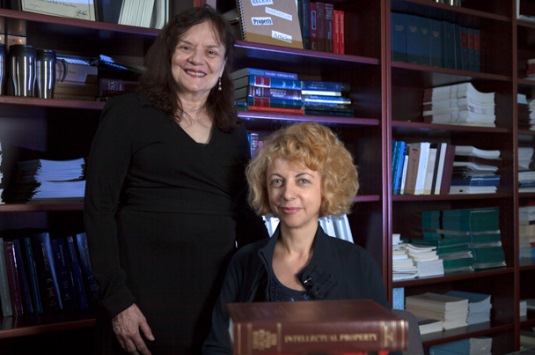DePaul’s intellectual property law program has always ranked among the top 25 in the U.S. News & World Report guide to law schools. This success reflects the breadth and depth of the curriculum, the scholarly work of the faculty, and the success of students in finding good
jobs in the field. Enabling all those qualities is the Center for Intellectual Property Law & Information Technology (CIPLIT®). When the center was started 15 years ago, few law schools had anything like it. Now, though the field is crowded with similar centers, CIPLIT® still leads in innovation and relevance.
 Photo by Mark Zalewski
Photo by Mark ZalewskiHere, Margit Livingston (standing), professor of law and director of the center, and Ellen Gutiontov (sitting), the center’s executive director, discuss how CIPLIT® keeps its edge in contributing to the IP program’s vitality.
What does the center
do and why does it matter?
EG: The center supports students interested in
intellectual property law—patents, copyrights, trademarks and trade secrets—by
providing course offerings, academic and professional mentoring, access to job
opportunities, experience in legal writing and connections to practitioners. We
broaden their perspective about the world of intellectual property—a world
that’s big, complex and increasingly important in everyday life.
ML: Students are definitely drawn to DePaul because of the center because we help make sure that they get what they need to succeed, from day one to graduation. For example, we just created a program for first-year students because, within their required curriculum, they can’t take an IP course until their second year. The six-week lecture series, Introduction to IP Theory and Practice, gives them a head start in skills training.
At the heart of what we do is a very rich curricular offering. We spend a lot of time, as and with IP faculty, deciding what courses to offer, when and in what sequence. And we reach out to practicing attorneys if we need specialized knowledge for a niche course. DePaul is all about providing an excellent education; so is the center.
How does the center “keep up with the times” in this field?
EG: We’re constantly tweaking what we do and what we offer students, always asking the question, “What’s really hot in IP right now?” We might create a new course or invite a special speaker to campus. For example, we just started a class on the laws addressing data breaches because security and privacy are such huge issues.
ML: Our goal is practice-ready lawyers, so we’re always adding skills-oriented courses, say on IP litigation, or legal writing and drafting, or IP license negotiation, or art market transactions—courses that prepare our students for practice from the first day after graduation. We just strengthened our technology and intellectual property clinic, which was also a first in the country; now, it’s being run by a lawyer practicing in the field, so our students can do work for real clients. In the same vein, we expanded our mentorship program—faculty-student mentoring and attorney-student mentoring—so that students get a lot of practical, real-world advice about classes, resume writing, networking and interviewing. Our advisory board is made up of attorneys, many of them graduates of our program, who help us understand the marketplace so we can continuously improve the ways we serve students.
EG: We also offer four certificates to graduate students—in general IP, patent law, information technology, and arts and museum law—as well as a Master of Laws degree in intellectual property, a one-to-two-year program beyond the JD. Of course, the IP faculty is very strong, in every aspect of the field, including cyber law, patent law and copyright law.
So, what’s on the horizon for the center?
ML: We’re hosting the annual Intellectual Property Scholars Conference from August 6 to 7, which was started at DePaul 15 years ago by Roberta Kwall. It’s for academic scholars, who present papers and get feedback from their peers. Three other law schools co-sponsor the conference: Berkeley, Stanford and Cardozo. We rotate the venue every year, and 2015 is our turn. So, that’s very exciting.
EG: We expect 150 or more professors, researchers and thinkers in advanced technology, law and policy. This is the main academic event in the field, the one that attracts the whole national IP community. It’s the place to go, really. This is the kind of thing that put DePaul on the map—and keeps DePaul on the map—in intellectual property law.